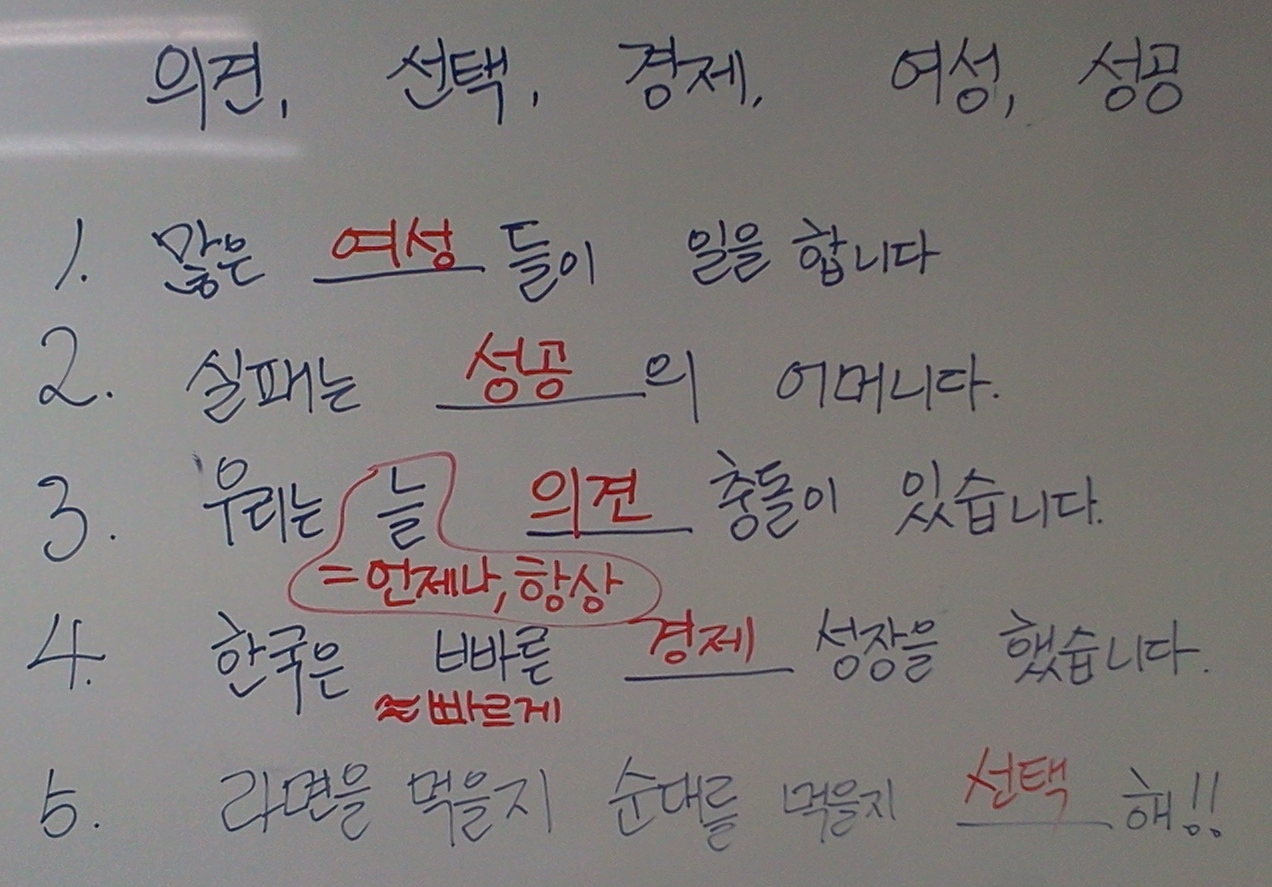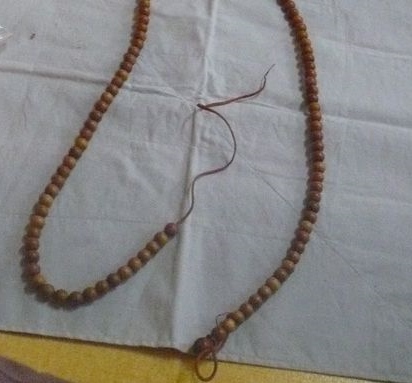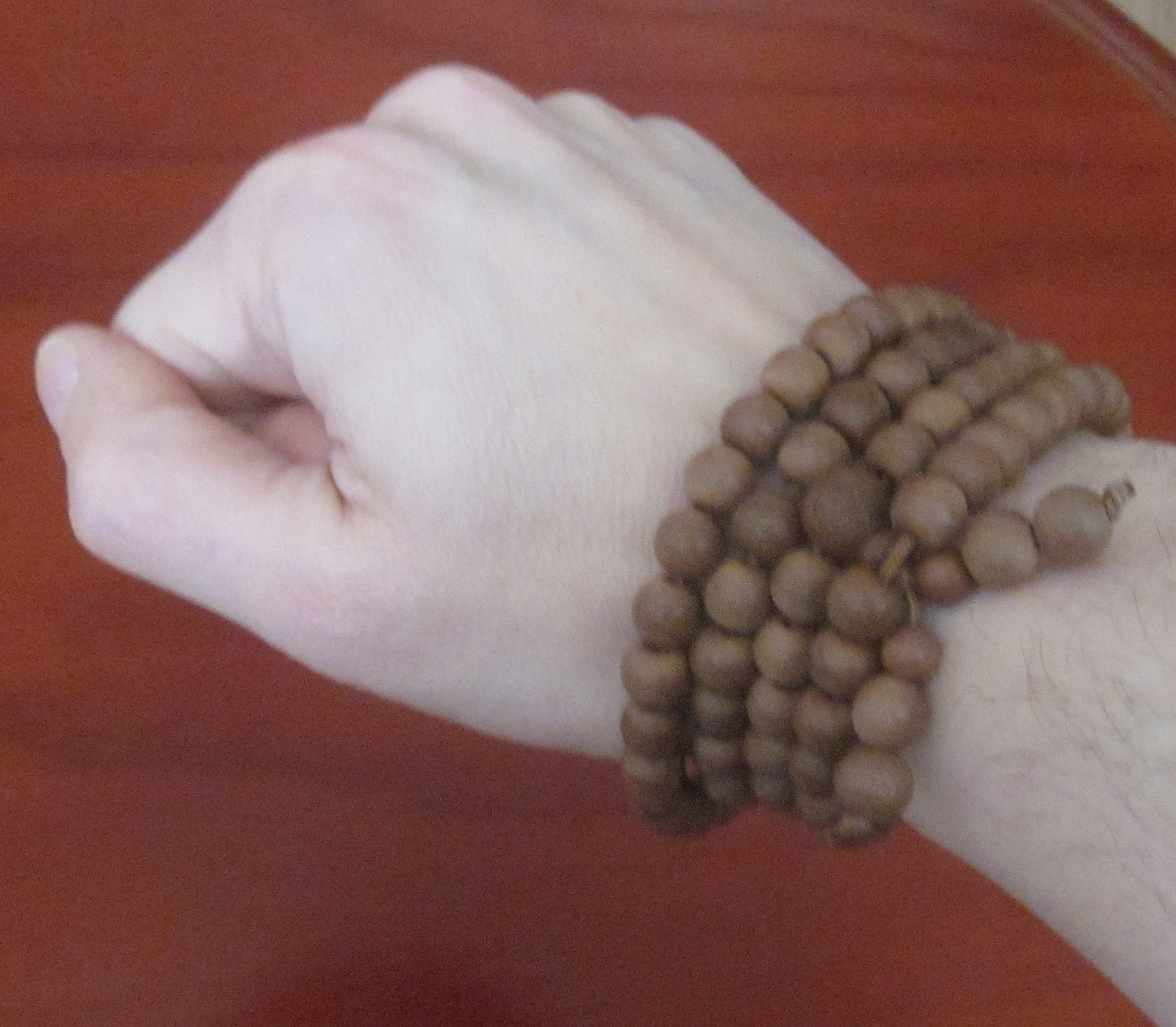똥인지 된장인지 분간할 수 없다
shit-be-WHETHER miso-be-WHETHER distinguish-FUTPART able not-have
[He] can’t distinguish whether it’s shit or soybean paste [=miso].
“He can’t tell shit from shinola” or “Wouldn’t know his ass from a hole in the ground” might be similar in tone and meaning.
In the picture at right, the shit is asked: “You… are you shit?” “Are you miso?” The shit answers, “Turns out~ Shit~”
Category: 한국말을 배움 (Failing to Learn Korean)
Caveat: 잘나도 내 낭군, 못나도 내 낭군
잘나도 내 낭군, 못나도 내 낭군
is-handsome-TOO my dear-husband, is-ugly-TOO my dear-husband
My dear husband is both handsome and ugly.
So, the one place where I found this phrase or proverb translated (interpreted) to English (actually he only interprets the truncated second clause but I suspect it’s familiar enough that the first clause is then understood) seems to think it’s equivalent to Churchill’s “Democracy is the worst form of government except those others that have been tried.” That commenter also suggests “Every human being is defective.”
I think those are very broad interpretations – too much poetic license being taken. But I can’t be sure…
I found another spot where some blogger blogging in Korean seemed to implying a political context for it, too – but my Korean is too lousy to really guess what that’s about. What I did understand is that a substitution is suggested, replacing “내 낭군” [my dear husband] with “우리 대통령” [our president], hence “잘나도 우리 대통령, 못나도 우리 대통령” [Our president is both handsome and ugly] (meant metaphorically maybe – but see picture of former president, at right).
I think maybe a better phrase might be something short and more personal: “I like him/her/it, warts and all.” Just that we accept the good with the bad in any given situation. Since I haven’t been able to find the source context for this line, I’m really just speculating. My intuition is that it doesn’t feel like an “old proverb” so much as a recent phrase that was popularized in some novel or TV show or suchlike.
Caveat: 닭의 모가지를 비틀어도 새벽은 온다
닭의 모가지를 비틀어도 새벽은 온다
chicken-GEN neck-OBJ twist-CONCESS dawn-TOPIC come
Even if you wring the rooster’s neck dawn still comes.
Killing the bearer of bad news doesn’t change the bad news. Perhaps “Don’t kill the messenger” is something equivalent. More seriously, this might be an admonition against magical thinking.
Caveat: 양자택일 (兩者擇一)
양 자 택 일
both-people-choose-one
Selection between two choices
For this proverb, “Have your cake and eat it too,” is the meaning suggested on one site. But I think it’s more simple than that – it’s saying you have to make a choice – it doesn’t seem to carry as much baggage as the English version about cake with respect to the type of choice to be made.
Like some others I’ve chosen, this is one of those Chinesisms (Sinisms?). It’s not so much a proverb as it is simply some Chinese that’s fossilized in toto into the Korean language. Like some of the others, too, it can be verbified, just like so many noun-phrases in Korean: 양자택일하다 [yang-ja-taek-il-ha-da = to make a selection between two choices].
There seems to be a special category for these specifically four-syllable Sinisms – I hesitate to think of them as proverbs at this point, and I learn more Korean in studying the hanja dictionary trying to figure out the meaning than I learn from the phrase itself. The definition for this phrase was, “둘 중에서 하나를 고름, 둘 중에서 하나를 택하다.”
둘 중에서 하나를 고름,
two between-LOC one-OBJ equal-GER
둘 중에서 하나를 택하다.
two between-LOC one-OFJ choose
Two things being equal, choose one.
Caveat: 도둑을 맞으려면 개도 안 짖는다
도둑을 맞으려면 개도 안 짖는다
thief-OBJ meet-INTENT-COND dog-TOO not bark-PRES
Even when you meet a thief the dog doesn’t bark.
This is the proverb that encompasses what we call Murphy’s Law or the Peter Principle in English: anything that can go wrong will go wrong.
Unable to find a suitable illustration of this proverb online, I decided it would be easier to make one, myself. So here is my picture.
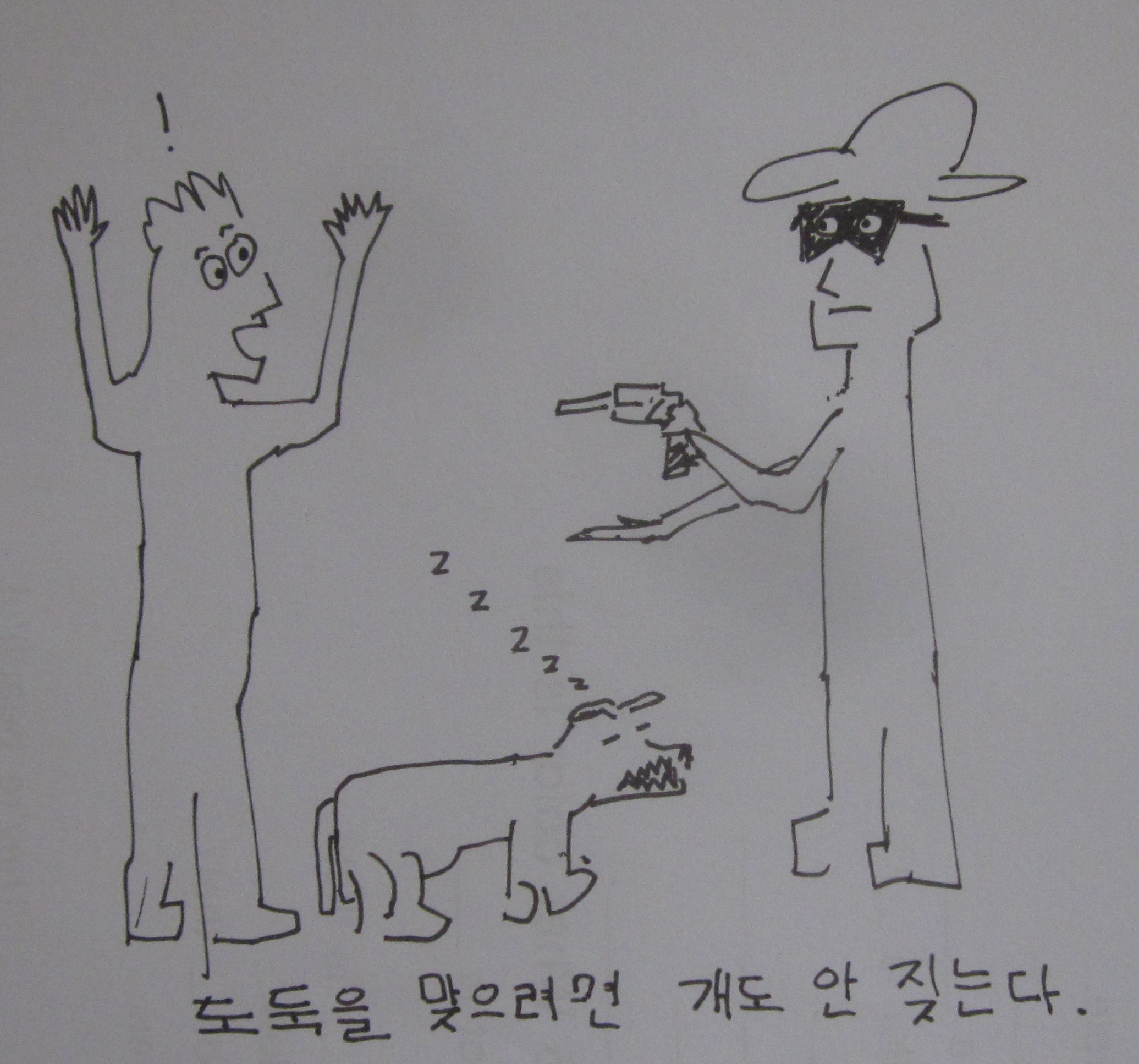
Meanwhile, I took this picture walking to work yesterday – Spring is finally emerging in Ilsan. I met no thieves. Then again, I have no dog.
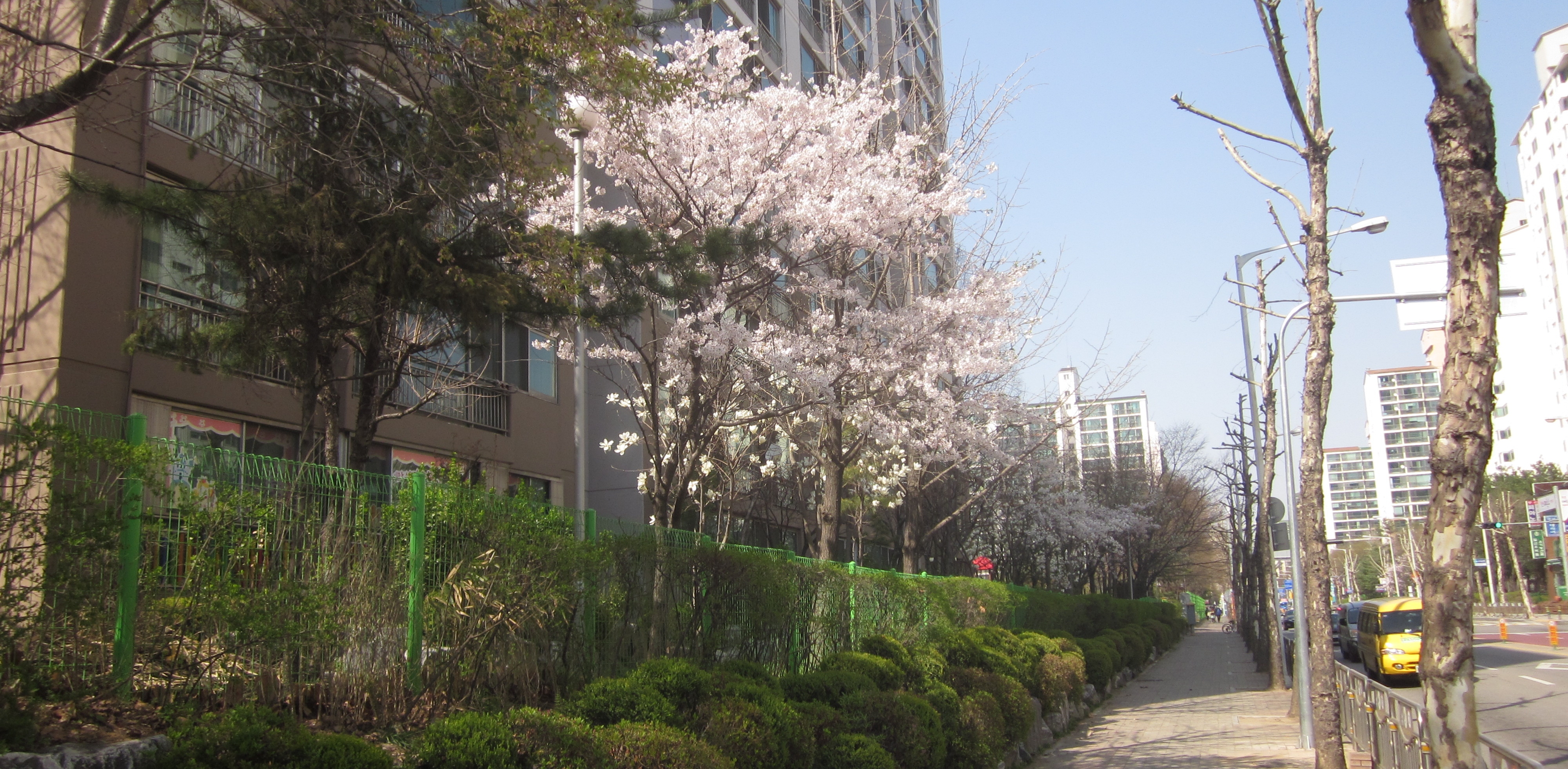
Caveat: 양지가 있으면 음지도 있다
양지가 있으면 음지도 있다
sunny-spot-SUBJ have-IF shady-spot-TOO have
If there’s a sunny spot there’s a shady spot too.
“Every silver lining comes attached to a cloud.” This is the inverse of “Every cloud has a silver lining,” but the meaning ends up being the same. There’s a related proverb that goes,
양지가 음지 되고
sunny-spot-SUBJ shady-spot become-CONJ
음지가 양지 된다
shady-spot-SUBJ sunny-spot become-PRES
Sunny spots become shady spots and shady spots become sunny spots.
I think what I like most is the idea the Korean has special words that mean shady spots and sunny spots. It’s like a language invented by cats.
The picture below shows Bernie-the-Cat finding a sunny spot on the front stoop of my home in Lansdale, Pennsylvania, in 1997.
Bernie-the-Cat was the youngest of three cats that Michelle and I had, first in Minneapolis and later in Philadelphia.
Caveat: 왜저레꺼몽키
My student who recently changed her name to Jara (which is just something she invented as far as I can tell) drew a picture of my minneapolitan rainbow monkey holding some bananas (at right).
The first part of the descriptor to the right of the monkey's head is easy to understand: 왜저레 [wae-jeo-re = "what the heck" – but in this context it's my name: "way-je-ret"]. The last part of the descriptor is easy to understand: 몽키 [mong-ki = "monkey" obviously]. So the overall intended meaning is clear to me, too: "Jared's monkey." But the suffix on my name was puzzling me: -꺼 [kkeo].
The ending is not in my reference grammar. And the initial explanations from my coworkers only told me what I already had figured out – it's a possessive. The standard possessive suffix (i.e. genitive case ending) in Korean is -의 [ui]. It's the only one I thought existed. So confronted with what seemed a new one, after so many years… of something so basic. Well, I was distraught.
None of the Koreans I asked seemed at all unfamiliar with it – they all took it as obvious. But when I pointed out that it wasn't in my reference grammar or anywhere to be found in any online dictionary or web search, they, too, were scratching their heads. I began to suspect it was a sort of informal or slang contraction of something – but of what, exactly? It's not even to be found in Samual E. Martin's presumeably exhaustive Reference Grammar. Therefore if it's slang, it's fairly recent or considered somehow more obvious than you'd think.
Eventually, a coworker of mine suggested it was a contraction of -의것 [uigeot]. This isn't entirely implausible – there's a sort of tendency to faucalize (geminate) consonants in the context of contraction processes in the language. So dropping the [ui] and faucalizing the [g] -> [kk] seemed vaguely conceivable.
So I'm going to settle on the idea that -꺼 = -의것 for now.
I'm not sure why Jara made herself into a turtle at my monkey's feet. That's more of a psychological puzzle than it is a linguistic one, however.
Another student in the same class drew a portrait of me on his vocabulary quiz. I appreciate its minimalism.
Caveat: 목구멍이 포도청이다
목구멍이 포도청이다
throat-SUBJ police-bureau-IS
The throat is the police.
I guess 포도청 (捕盜廳) was a name for the police bureau in Joseon times. So one is saying that the throat (gullet, i.e. appetite?) is the police bureau. I can see how this could lead to a translation as “Desperation recognizes no law” and even “The devil dances in an empty pocket.” The law of hunger overrides other laws.
Caveat: 고양이의 그림
Caveat: 동상이몽 (同床異夢)
Another one of those Chinese proverbs, read in Korean:
동 상 이 몽
same table different dream
This was provided with the translation “Different dreams in the same bed.” But 상 (床) seems to mean “table,” not “bed” based on my looking at a hanja dictionary. Other than that, it sort of makes sense, despite being Chinese, not Korean.
The meaning would be, “People are never alike in their minds.” Should we therefore be wary even of those we trust, perhaps?
Caveat: 강사 평가 기록표
In a staff meeting yesterday, I was handed the below form. It’s called “강사 평가 기록표” which means something like “teacher evaluation worksheet.”
I think it’s a good thing we’re doing teacher evaluations. It’s actually something I suggested we do, a long, long time ago. I asked what I was supposed to do with it, though, given that it was in dense and jargony Korean. Someone said, “You can figure it out.”
On the one hand, I welcome the opportunity to work on my Korean. But on the other hand, I somewhat resent when it’s made obligatory by my work environment.
I’ve noticed something recently: as my listening and comprehension skills with the Korean language have improved, my coworkers actually tell me less than they used to. They just assume I know what’s going on, because sometimes (but only sometimes), I actually do just know what’s going on. But they inform me directly much less than they used to, and furthermore, when I ask, “what’s going on?” I am often downright ignored. What’s with the attitude change? Do they think they’re helping me learn Korean? Mostly they’re just making me feel annoyed, because I have no idea what’s going on at work.
So… what’s going on? With that, I mean.
Crickets.
Caveat: 말이야 좋지
말이야 좋지
word-CONTR good-SUSP
Words are good [but…]
I understand this almost perfectly but I’m just as almost clueless how to understand the grammar of it.
It’s not really a complete sentence – the “-지” ending on the verb stem “좋” is what I think of as a contingent negative, a sort of non-finite subjunctive or something like that (in saying that, I don’t mean to offer some alternative interpretation to the formal linguistic description – e.g. Martin calls it a “suspective” ending, but that term [like most of Martin’s] seems rather misleading [or limiting] about usage). So you could read the verb as “I suppose it’s good” and then you add the contrastive “-이야” on the noun “말” which means all kinds of things, but mostly “words.”
So eventually you get something like “Sure, words are good, but…”
In fact, this phrase basically seems to mean: “The road to hell is paved with good intentions.”
Caveat: 기대가 크면 실망도 크다
기대가 크면 실망도 크다
expectation-SUBJ be-big-IF disappointment-TOO be-big
If expectation is big then disappointment is big.
“Big hopes lead to big disappointments.” This was easier than most of the proverbs I’ve attempted lately. The grammar was pretty straightforward and the vocabulary was basic.
I can relate to this proverb.
Caveat: 부전자전 (父傳子傳)
부전자전 (父傳子傳)
father-transmission-son-transmission
… transmission from father to son.
“Like father like son.” This is another one of those “actually it’s Chinese-not-Korean” proverbs I’ve been running across. A Chinese proverb nativized into Korean in toto. Just like Latin fossils persist in English, e.g. “in toto.” This one, according to the dictionary, can even be made into a verb: just put the good ol’ -하다 on the whole thing, and it’s a verb meaning to transmit from father to son. I like that.
I’m more like my father than I prefer. I’m a bit of a flake – not very reliable. Further, I tend to not reach out or communicate with people. This is clearly a trait of both my parents, but more my father than my mother in style and mode.
Caveat: 절반의 성공
절반의 성공
half-GEN success
[…like] half of success.
“You’re halfway!” “See the cup as half-full, not as half empty.” I’m think this proverb is meant in this vein, like as a way of encouraging people. But I could be misunderstanding it, and it might mean “Not worth the effort.” I have no idea. Then again, it might be neutral in meaning, indicating you could look at it either way.
Given my own pessimistic tendencies, I should take this kind of thinking more to heart. I’m much better at being optimistic toward others than I am toward myself.
Caveat: 다 된 밥에 재 뿌리기
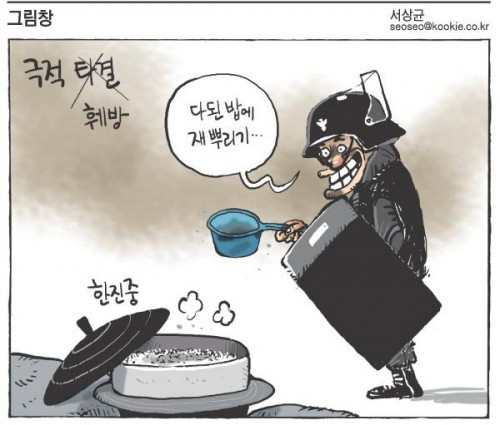
다 된 밥에 재 뿌리기
all make-PPART food-IN ashes spread-GER
[Like…] spreading ashes on prepared food.
“Rain on someone’s parade.” Spoil someone’s happiness.
Sure, I can do that: I’ve been on both ends of it.
Caveat: 화장실 나오는 마음은 들어갈 때와 다르다
화장실 나오는 마음은 들어갈 때와 다르다
toilet exit-PRPART mind-TOPIC enter-FUPART time-CONJ differ
The mind entering the toilet differs from the mind exiting.
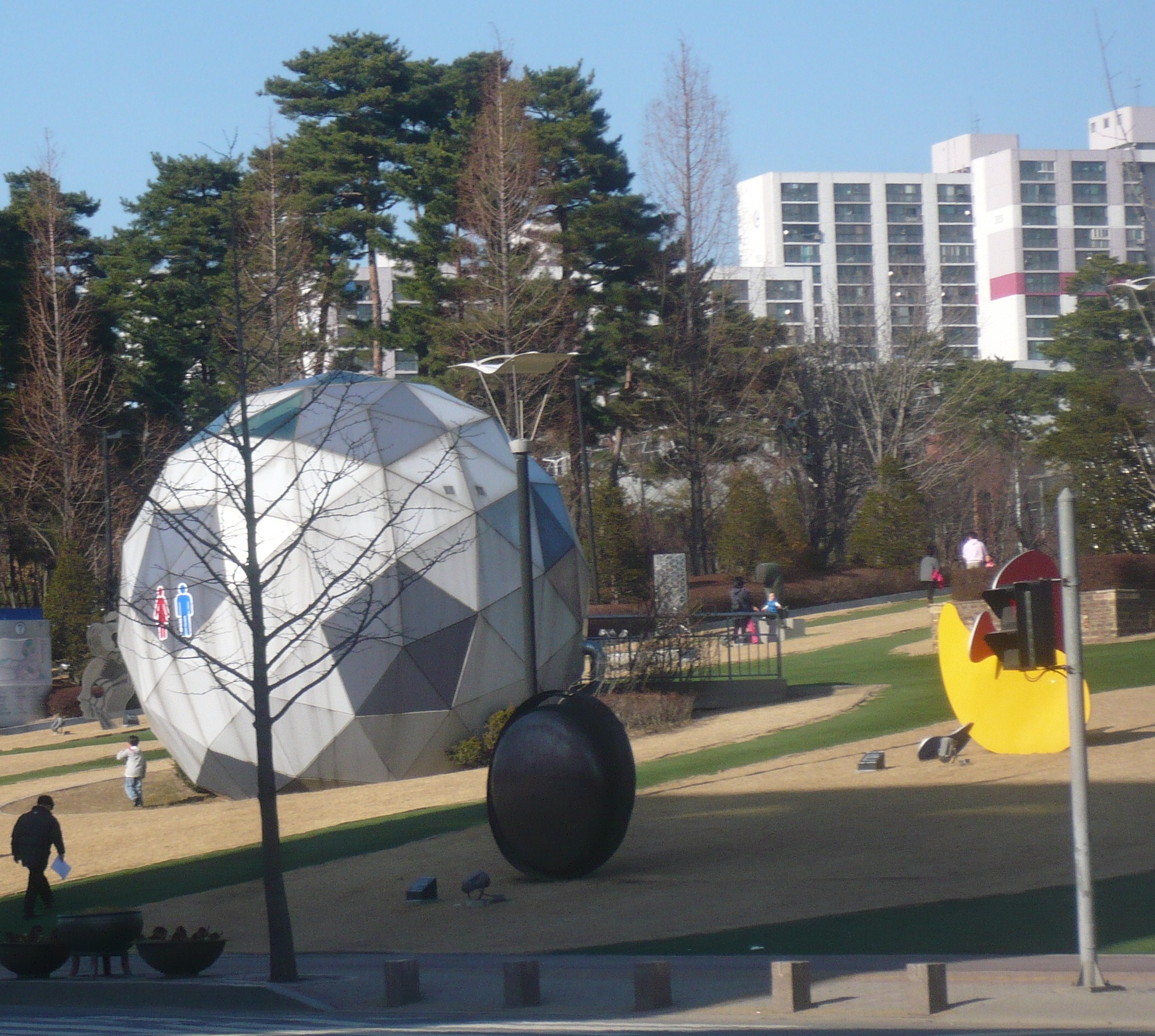
“People are fickle.” This is about unreliability. This is pretty funny, for a proverb. Here’s a picture I took in 2010 in Suwon – a public restroom I saw there in a park that’s shaped like a soccer ball. Now we can add to that this knowledge that toilets change minds.
![]()
Caveat: 실패는 성공의 어머니다
In my latest iteration of my efforts to study Korean: I’m doing some tutoring sessions on Saturday, a sort of language exchange.
I learned this proverb / saying:
실패는 성공의 어머니다
failure-TOPIC success-GEN mother-COP
Failure is the mother of success.
I think this makes sense. But failure is also the mother of more failure. And success can be the mother of more success. Not to be too gloomy. Call it the gene-mixing rule as applied to failure and success.
My notes from class (easy to take notes with a camera in your phone, right? – I learned that trick from my students):
What I’m listening to right now.
My Bloody Valentine, “Soon.”
Caveat: 매사는 불여 튼튼

매사는 불여 튼튼
everything-TOPIC blow-[?]-strong[ly]
In everything blow [as on a fire] strongly.
I don’t know what to do with the particle -여 after the 불 (flame? if it’s a noun). Is it a form of the copula? Is it some other thing? So… is it a conjugation of the 불다 (blow) instead? The one place I found this proverb with any kind of translation, it was correlated with a meaning something like “Always double-check.” So I’m going to go with a strange defective conjugation of 불다, maybe a kind of imperative, I guess, but I feel like I’m not really understanding this. The word order is very non-Korean-seeming, too – why is there a sort of adverbialized 튼튼 at the end? That’s not a normal place for it.
Caveat: 꿩 대신 닭

꿩 대신 닭
pheasant substitute chicken
Substitute pheasant for chicken.
“Better half-a-loaf than none.”
This seems reasonable. Am I having a pheasant life?
Caveat: 구슬이 서 말이라도 꿰야 보배라
구슬이 서 말이라도 꿰야 보배라
bead-SUBJ hold[?] word[?]-EVEN-IF string[Verb-meaning]-IN-ORDER-TO treasure-[?]
[Something about beads being held and treasure and stringing them together]
This was impossible for me to translate. Lately, I’ve been finding all these Korean proverbs that I really can’t figure out. I get the meaning of this one but individual vocabulary items, like “서” and “말” are what I think of as overloaded homonyms – there are so many possible meanings that I can’t make a decision that narrows it down, even within context. Each of those morphemes has several dozen dictionary entries. I can only guess how they fit together, even given the context of beads and string. I don’t get 보배라 either. Google translate is useless. 보배 is “treasure” but then what is 라? – that’s a verb ending meaning command, or else it can crop up in the rather irregular conjugation of the copula (BE verb), but in that case it’s preceded by morpheme 이 which is the main copula. I’m stumped.
“Beads cannot make a necklace without string.” This is a slight alteration of a translation found online, which is unenlightening vis-a-vis the nuts-and-bolts grammar of the sentence.
I think the point of the proverb is that you need string to string beads – not just beads. You need a certain minimum to get along to something. Not sure what the English equivalent proverb is.
The pictures below are my prayer beads I strung along with 108 bows (prostrations) while on the temple stay in 2010.
Caveat: 求全之毁
구전지훼
???
I was utterly unable to figure this out. I can’t even find dictionary entries that make sense to me.
I don’t actually think it’s Korean, based on some research. I think it’s Chinese. But like most old Chinese, it has a “Korean pronunciation,” which is what that is above. The hanja (Chinese) is: 求全之毁. It’s by Mencius (孟子=맹자) – the Confucian philosopher from long, long ago.
So I didn’t know what it was, but I found it in the online hanja dictionary, with a definition in Korean: 행동이나 몸가짐을 빈틈없이 온전히 하려다가 오히려 뜻밖에 남에게 욕을 듣게 됨. This was too hard for me to figure out, but I started to get the drift, and did some searching. I found this more concise definition: 온전하기를 구하다가 비난받음. This could translate as “Condemned to seek perfection.”
That, at least, makes sense. But I also found Mencius’s phrase linked to Moliere’s: “The perfect is the enemy of the good.” So maybe that’s a rough equivalent proverb? Hard to say. I’m giong to have to think about it.
Caveat: 걱정도 팔자
걱정도 팔자
worry-TOO sell-PROP
Let’s even sell worries.
“Don’t worry about it” or “You worry too much” or even “None of your business.” It doesn’t feel particularly polite.
I also found a version with the ending -군 (i.e. 걱정도 팔자군) in the daum.net dictionary, but that is much more puzzling to me grammatically, since I had no idea an exclamatory and a propositive could combine that way: a sort of exclamatory proposition?
Caveat: Korean Independence Day
오늘 삼일절입니다. 지난주동안 저의 수업들에서 민족 자결권 각 국가의 권리를 토론의 주제로 가르쳐 했습니다. "우리 조선은 이에 우리 조선이 독립한 나라임과 조선 사람이 자주적인 민족임을 선언하노라." – 1919/3/1 운동 독립 선언
Caveat: 거름 지고 장에 간다
거름 지고 장에 간다
fertilizer carry-AND field-TO go-PRES
Carry fertilizer and go to the field.
According to one site, this supposedly means “Jump on the bandwagon.” I couldn’t confirm it anywhere else, though, despite some searching and googling. I would need more cultural information to confirm this – as it stands, I honestly don’t feel like I know what this means.
Caveat: 바르고 슬기롭게
The 강선 (Gangseon) elementary school, which is the elementary school closest to my apartment building, has a motto over its entrance. Most schools have mottos over their entrances, but this one, because I see it every day, sticks with me.
바르고 슬기롭게
honest-AND wise-ADV
Honestly and wisely
That's a good motto. I do ok at honest, most of the time. I'm not so wise. I think most people have more trouble with that, maybe.
Caveat: 님의 침묵(沈默)
님의 침묵(沈默)
님은 갔습니다. 아아 사랑하는 나의 님은 갔습니다.
푸른 산빛을 깨치고 단풍나무 숲을 향하여 난 작은 길을 걸어서
차마 떨치고 갔습니다.황금의 꽃같이 굳고 빛나던 옛 맹서는
차디찬 티끌이 되어서 한숨의 미풍에 날아갔습니다.날카로운 첫 키스의 추억은 나의 운명의 지침(指針)을 돌려 놓고
뒷걸음쳐서 사라졌습니다.나는 향기로운 님의 말소리에 귀먹고
꽃다운 님의 얼굴에 눈멀었습니다.사랑도 사람의 일이라 만날 때에 미리
떠날 것을 염려하고 경계하지 아니한 것은 아니지만,
이별은 뜻밖의 일이 되고 놀란 가슴은 새로운 슬픔에 터집니다.그러나 이별은 쓸데없는 눈물의 원천을 만들고 마는 것은
스스로 사랑을 깨치는 것인 줄 아는 까닭에,
걷잡을 수 없는 슬픔의 힘을 옮겨서
새 희망의 정수박이에 들어부었습니다.우리는 만날 때에 떠날 것을 염려하는 것과 같이
떠날 때에 다시 만날 것을 믿습니다.아아 님은 갔지마는 나는 님을 보내지 아니하였습니다.
제 곡조를 못 이기는 사랑의 노래는 님의 침묵을 휩싸고 돕니다.– 1926, 한용운 (韓龍雲)
This is one of the most famous poems in modern Korean. I ran across a reference to it in my ongoing history-book reading, and decided to pursue it.
Han Yong-un was a Buddhist monk and independence leader, also involved in the March 1st movement of 1919 (I think). His pen-name was Manhae (萬海). Poetry is always hard to translate – I wouldn't dream of trying to translate this – I can barely understand it, in Korean.
I found three quite different translations. One unattributed translation I found here. I found another unattributed translation here. There is a third, quite formal reading, that emphasizes the religious dimension of the poem, at the English wikipedia entry about the poet.
I prefer the first of the translations I ran across. Note that the "you" of the poem might be a lover, or the Buddha, or Korea – or all three mixed together.
YOUR SILENCE
You have gone. Ah, my love, you have gone.
Shattering the green brilliance of the mountain, hard as it might
be, cutting off all ties, gone along the narrow path that opens
out to the maple grove.
The old vows, firm and splendid as flowers of golden metal,
have turned to dust and flown odd in the breath of a sigh.
The memory of a sharp first kiss reversed the compass needle
of my fate, stepped backward and faded.
I was deafened by your perfumed sounds and blinded by your
flower-like face.
Love too is man's lot; even though we have prepared with fear of
parting at meeting, parting comes upon us unawares and the
startled heart bursts with a fresh sorrow.
However, since I know that to make parting the font of needless
tears is to shatter love, I have transferred the irresistible power
of sadness and poured it over my brow to quench the old ill
with fresh hope.
Just as we fear parting when we meet, we believe we will meet
again when we part.
Ah, even though you are gone I have never said good-bye.
The sad melody of my song of love curls around your silence.
[Update
2013-04-20: A recent commenter (see also the comments section, below) found both
attributions. The first link appears to be broken now, but my commenter points
out that the first translation is by Sammy Solberg, and appears in the Columbia Anthology of Modern Korean Poetry. The second translation is apparently by Jaihiun J. Kim.]
Caveat: 가르치는 것도 배우는 것도 소중한 인연입니다
가르치는 것도 배우는 것도 소중한 인연입니다
teach-ACT-TOO learn-ACT-TOO be-precious-PART karma-is-FORMAL
Both the act of teaching and the act of learning are precious [parts of] karma.
This isn't a regular proverb or aphorism. It's the "motto" at top right of KarmaPlus's monthly newsletter (image at right – click to embiggen). I'm not sure if the boss got it from somewhere, or if he made it up himself. On the one hand, it ties together the mission of the hagwon – teaching – with the name of the place, since the concept of karma in Korean is often 인연 (destiny, fate, cause). On the other hand, it's a subtle (almost coded) reference to his Buddhism. One can find equally subtle coded references to the religious affiliations of other businesses, in Korea – especially hagwon. I can sometimes guess a hagwon's "affiliation" just by considering the references of their advertising copy – if I can figure it out.
I sometimes wonder how aware Koreans are of these references, and whether they make consumer decisions (such as what hagwon to send their children to) based on them, the way that American evangelicals, for example, will intentionally take their business to the "Christian Fish." e.g.
– or the way that non-evangelicals, for that matter, will avoid businesses flagged the same way.
Caveat: 처얼썩 처얼썩 척 쏴아아
해에게서 소년에게
처얼썩 처얼썩 척 쏴아아.
때린다 부순다 무너 버린다.
태산 같은 높은 뫼, 집채 같은 바윗돌이나,
요것이 무어야, 요게 무어야.
나의 큰 힘 아느냐 모르느냐, 호통까지 하면서,
때린다 부순다 무너 버린다.
처얼썩 처얼썩 척 튜르릉 꽉.처얼썩 처얼썩 척 쏴아아.
내게는 아무 것 두려움 없어,
육상(陸上)에서, 아무런 힘과 권(權)을 부리던 자라도,
내 앞에 와서는 꼼짝 못하고,
아무리 큰 물건도 내게는 행세하지 못하네.
내게는 내게는 나의 앞에는
처얼썩 처얼썩 튜르릉 꽉.처얼썩 처얼썩 척 쏴아아.
나에게 절하지 아니한 자가,
지금까지 있거든 통기(通寄)하고 나서 보아라.
진시황(秦始皇), 나파륜*, 너희들이냐.
누구 누구 누구냐 너희 역시 내게는 굽히도다.
나하고 겨룰 이 있건 오너라.
처얼썩 처얼썩 튜르릉 꽉.처얼썩 처얼썩 척 쏴아아.
조그만 산모를 의지하거나,
좁쌀 같은 작은 섬, 손뼉만한 땅을 가지고,
고 속에 있어서 영악한 체를,
부리면서, 나 혼자 거룩하다 하는 자,
이리 좀 오너라, 나를 보아라.
처얼썩 처얼썩 튜르릉 꽉.처얼썩 처얼썩 척 쏴아아.
나의 짝 될 이는 하나 있도다.
크고 길고 넓게 뒤덮은 바 저 푸른 하늘.
저것은 우리와 틀림이 없어,
작은 시비, 작은 쌈, 온갖 모든 더러운 것 없도다.
조따위 세상에 조 사람처럼.
처얼썩 처얼썩 튜르릉 꽉.처얼썩 처얼썩 척 쏴아아.
저 세상 저 사람 모두 미우나,
그 중에서 똑 하나 사랑하는 일이 있으니,
담 크고 순진한 소년배(少年輩)들이,
재롱처럼 귀엽게 나의 품에 와서 안김이로다.
오너라 소년배 입 맞춰 주마.
처얼썩 처얼썩 튜르릉 꽉.
– 최남선 (1890 ~ 1957)
From the Sun to a Boy
Splash, Splash, Splat, Swash.
Beat, Break, Destroy
"Mountains as high as heaven, Rocks as big as a house
What is it to me, What is that to me
Do you not know my might" – bellowed the Sun
Beat, Break, Destroy
Splash, Splash, Splat, Smash, Boom.Splash, Splash, Splat, Swash.
"I fear nothing in this world.
The mighty and the powerful of this world,
They all shrivel before me.
The great machineries, how great they are, are no equal to me."
"To me, To me, Before me"
Splash, Splash, Splat, Smash, Boom.Splash, Splash, Splat, Swash.
"If there was a man who has the courage to not prostrate before me,
Come out before me.
Qin Shi Huang, Napoleon – are you the one.
Even you have bowed before me.
Anyone who can wrestle with me – Come."
Splash, Splash, Splat, Smash, Boom.Splash, Splash, Splat, Swash.
"You, with your small mounts,
You, with your small isles and lands,
You, who are so satisfied by your own intellect
You, who are conceited with self-righteousness,
Come before me and behold."
Splash, Splash, Splat, Smash, Boom.Splash, Splash, Splat, Swash.
"In this world, there is only one thing that is worthy to be my companion.
The Blue Sky – who covers this world with all its splendor.
No doubt it is our equal,
As it is not corrupted by those small quarrels, small fights, and all the smears
Of that world and the people who occupy it.
Splash, Splash, Splat, Smash, Boom.Splash, Splash, Splat, Swash.
Among that wretched world and all those hateful people,
There is one thing I love.
It is when those innocent boys with their great dreams
Come into my bosom.
Come, boys. And I'll greet you with all my love.
Splash, Splash, Splat, Smash, Boom.
- Choe Namseon (1890 ~ 1957)[Translation by Jae Paek, found at his blog, for which I will express thanks and due credit.]
I've been reading the third volume (cover at right) of the history of Korea that I've been working on ([broken link! FIXME] first and [broken link! FIXME] second volumes completed). The author, Han Young Woo, says that the above poem by Choe Namseon "was the first modern-style poem ever written in Korea." So I found it online, and read it.
I definitely agree with his assessment of its modernism. It reminds me, vaguely, of Huidobro, for some reason. I can't be certain it is, in fact, the first, but it certainly was early. I really like the onomatopoeia.
Caveat: 겉똑똑이
겉똑똑이
surface-smart-person
A person smart on the surface.
Some site had this as "Penny wise, pound foolish." I suppose a person behaving that way is a superficially smart person. But I don't see the specific link to that English proverb – it really just seems to mean exactly what it says: a superficially smart person.
I'm worrying about if I should go to the dentist. But last week when I had time one morning I didn't think about it – I hate going to the dentist.
Caveat: 갈 데까지 가다
갈 데까지 가다
go-FUTPART point-UNTIL go
[One] goes as far as the point [one] will go.
"Pushing the envelope." Maybe. Really, just an essentially literal reading is pretty idiomatic sounding to me, in English: Going as far as one can go.
The picture is one I took at Patrick's Point, California, in 2009.
Caveat: 개밥에 도토리
개밥에 도토리
dog-food-IN acorn
[Like] acorns in dogfood.
This means someone or something out of place. "A fish out of water" or "A square peg in a round hole" are perhaps similar English expressions.
Anyway, I like it. I imagine the dog, eyeing his food suspiciously.
Caveat: 설
행복하고 마음 훈훈한 설 되시고 생각하는 대로 모든 것 이루시는 새해 되실겁니다.
That was the text message from my boss for this Lunar New Year's Day. It's a kind sentiment, but grammatically it's monstrous. Roughly: "May you have a new year in which you accomplish everything, as soon as you think to have a warm-hearted and happy New Year's Day." Which is to say, positive thoughts on this day will ensure success throughout the year. Maybe.

